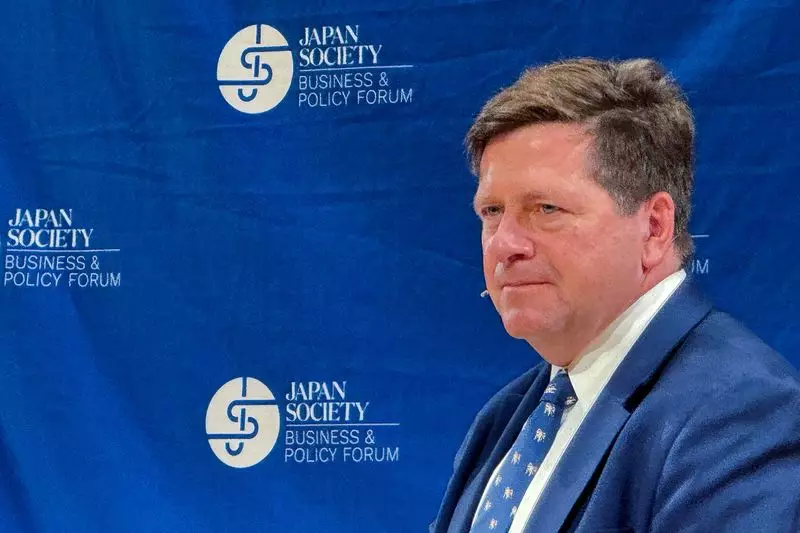The landscape of investment management is often tumultuous, particularly when it comes to leadership dynamics within major firms. Apollo Global Management, one of the largest alternative asset managers globally, is currently at a critical juncture. Following a recent history marked by internal disputes and external scrutiny, the possible exit of both its chairman, Jay Clayton, and its CEO, Marc Rowan, suggests a significant upheaval might be on the horizon. As the firm grapples with the implications of these potential departures, analysts and investors alike are closely monitoring the situation, weighing the possible benefits and challenges such changes could herald.
The recent selection of Jay Clayton by President-elect Donald Trump to serve as Manhattan’s top federal prosecutor raises questions about the future of Apollo’s leadership. This unexpected turn of events has led to frenzied speculation over who might fill the shoes of both Clayton and Rowan if they were to leave for government roles. While such appointments could theoretically bolster the investment community by reducing regulatory risks, they also set the stage for a possible leadership vacuum at Apollo.
Investors and market analysts from TD Cowen are fielding queries regarding Rowan’s potential appointment as Treasury Secretary, further compounding the uncertainty surrounding the firm. In response, analysts have indicated that despite the challenges associated with a transition in leadership, the involvement of Apollo figures in governmental positions could bring about favorable changes for the asset management industry as a whole. Indeed, experts suggest that such a shift could accelerate the firm’s entry into the lucrative retirement market, which has been identified as a key growth opportunity.
The question of succession at Apollo is compounded by the firm’s tumultuous past, particularly the chaotic dynamics that were exposed during the power struggle involving co-founders Leon Black, Josh Harris, and Marc Rowan. Rowan’s ascension to the CEO position in 2021 came on the heels of a public relations crisis linked to Black’s connections with Jeffrey Epstein. The fallout from these allegations reverberated throughout the company, leading to both strained relationships among co-founders and Harris’s exit from Apollo entirely.
Under Rowan’s leadership, the firm has attempted to shift its narrative from its private equity roots, pursuing innovative growth strategies designed to diversify its investment portfolio. The acquisition of Athene Holding in a substantial all-stock deal marked a strategic pivot for Apollo, allowing it to enter the retirement services sector more robustly. This acquisition was indicative of Rowan’s vision for expanding the firm’s footprint within the corporate credit investment arena—a move that successfully positioned Apollo among the world leaders in this space.
Stock market performance can often serve as a barometer of investor sentiment regarding leadership stability and future growth potential. Notably, Apollo’s stock reflected some volatility in relation to Rowan’s rumored candidacy for Treasury Secretary, as shares dipped on news of his potential departure. While the stock price showed some recovery later, the fluctuations underscore the market’s sensitivity to potential leadership changes. Investors are adept at reading the tea leaves: the prospect of Rowan’s exit has led to heightened scrutiny over who might succeed him, with co-presidents Jim Zelter and Scott Kleinman being perceived as potential front-runners for the CEO position.
Apollo’s regulatory filings highlight the importance of key personnel, though they do not disclose specifics. This understatement speaks to an industry-wide awareness of the critical role that individual leaders can play in shaping a firm’s trajectory. The dynamic character of the investment landscape necessitates a resilient and cohesive leadership structure—one that can facilitate ongoing growth and capitalize on emerging market opportunities, especially in the wake of potential upheaval.
While the potential changes in leadership at Apollo Global Management may induce a degree of uncertainty, they also pose opportunities for evolution within the company and the asset management industry at large. Should both Clayton and Rowan transition to their respective roles within the government, it will be essential for Apollo to navigate this period carefully, focusing on continuity and strategic growth while embracing innovative approaches to harness new markets. Ultimately, how Apollo manages these shifts will determine its ability to thrive in an increasingly competitive environment, proving that even in the face of instability, opportunity persists.

